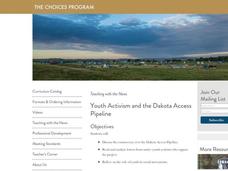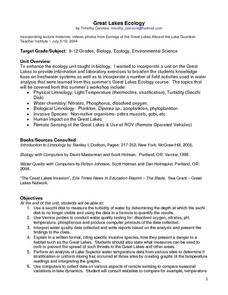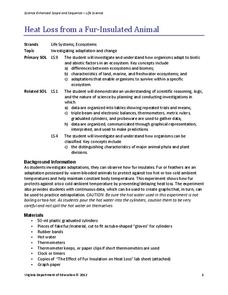Curated OER
Freshwater Macroinvertebrates
Students identify and count Macroinvertebrates at a Hydrology website. In this macroinvertebrates lesson students collect, sort and identify Macroinvertebrates.
Brown University
Youth Activism and the Dakota Access Pipeline
Do young people have a role in social movements? Should they? The involvement of young people in the Dakota Access Pipeline is the focus of a resource that asks class members to examine letters written by native youths who oppose the...
Curated OER
Aquatic Organisms and Their Habitats
Middle schoolers investigate the presence of specific organisms in a freshwater habitat to determine the quality of that habitat. They conduct a field study and distinguish and classify organisms found during the field study.
Curated OER
Ecosystems of the World
Middle schoolers are able to list different ecosystems and describe their environment and organisms. They have an understanding about the function and balance of the ecosystems. Students are able to tell what type of ecosystem the St....
Curated OER
How Much Water?
Students investigate amount of water available in different countries around the world, compare it to their daily water use, and explore how unequal distribution of water can cause challenges to survival. Students then discuss need to...
Curated OER
Food Webs in the Barnegat Bay
Students investigate the food webs in the Barnegat Bay. In this organisms lesson, students use a graphic organizer to illustrate the types of consumers in the bay. Students use reference books to continue to research the animals found in...
Curated OER
Local Habitats
Students create dioramas that depict a habitat. In this habitat lesson, students use a variety of art items to develop either a marine, freshwater/pond, or forest habitat in a box. They write an expository essay about their habitat, and...
Curated OER
Osmosis
Fifth graders explore osmosis as they watch organisms divide. In this organism instructional activity, 5th graders use potatoes to experiment with the effects of salty water in the body. Students discuss what osmosis is and record what...
Curated OER
Great Lakes Ecology
Eighth graders identify the Great Lakes, and describe the habitat of life of a loon. They are able to point to and explain one of the major river systems that enters the Great Lakes with a focus on the Clinton River and the food webs...
Curated OER
What's in the Water?
Students make a water sampler and use proper techniques to collect water.They write a essay explaining the inter-relationship of factors such as temperature, pH, dissolved oxygen, nitrates, and phosphates in a lake that might cause a...
Curated OER
The Water Cycle
Your class sets up a mini water cycle model to examine the process. Then they watch an animation, following a water molecule through the cycle. A well-developed lab sheet guides learners through the lesson and a PowerPoint presentation...
Curated OER
Save Your Breath
Students discuss metabolism. In this metabolism lesson, students evaluate evidence form a research report and discuss the basis for hypothetical metabolic adaptations to low-oxygen environments in the anchialine caves.
Curated OER
Floating Pencil
Students discover how salt water makes a pencil float better than freshwater by measuring and comparing the lengths of the portion of the pencil that floats above the water surface. They then determine if an unknown water sample is...
Curated OER
The Captain And Lake Wilmar
Tenth graders examine the ecosystem of Lake Wilmar through three coordinated performance tasks. They first investigate the effects of pH on freshwater animals by comparing the zooplankton counts from three different areas. They then...
Curated OER
BIOASSESSMENT OF STREAMS
Students work as a team to gather organisms from a stream to evaluate if the water quality is excellent, good, or fair to poor.
Curated OER
Saltwater Science
Students conduct an experiment that shows them how salt water allows things to float. In this salt water lesson plan, students mix ingredients together to create salt water and observe how it makes the oceans dense. They then interpret...
Curated OER
LD50 of NaCl to Gammarus spp.
High schoolers learn the meaning of LD50 through lecture and discussion. Through experiment, students graph and calculate the LD50 of salt on fresh water amphipods. High schoolers compare results of the experiment with pesticides and...
Curated OER
Got Water?
Students determine that delivering clean, fresh water to citizens around the world involves and affects politics, economics, international relations, and technology. They brainstorm a list of factors that might affect their town's...
Curated OER
Aquaculture
Students examine an experiment in which 2 types of commercial fish are fed a new type of fish feed and a commercial fish feed which costs ten times as much. They calculate in the fish grow as well with the cheaper fish feed and then...
Curated OER
Ecosystems and Remote Sensing
Students obtain remote sensing data to compare and contrast global biomass data with global temperature data.
Curated OER
Fish Communities in the Hudson
Learning to read data tables is an important skill. Use this resource for your third, fourth, or fifth graders. Learners will will study tables of fish collection data to draw conclusions. The data is based on fish environments in the...
Curated OER
LP 6--8: Xenopus laevis (frog) Development for a 7th Grade Audience
Seventh graders view lab stations with Xenopus at different stages of development. They identify the life stage of the sample, as well as the previous and next stages. Students must explain their reason for selecting the specific stage.
Curated OER
Sea Water Freeze
Middle schoolers observe how salinity affects the time it takes water to freeze. They participate in an experiment to determine that ice is essentially salt-free whether formed from fresh or salt water
Virginia Department of Education
Heat Loss from a Fur-Insulated Animal
How do animals adapt to weather changes? Provide your class with the ability to understand adaptations and body temperature as they participate in this hands on experiment, using fake fur and hot water. Pupils collect data and analyze...

























